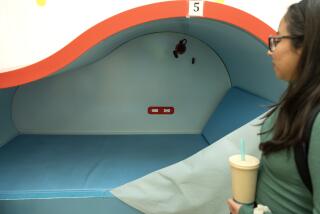Linking Up With New Resources : Education: Cal Lutheran professors are learning how to incorporate the new CLUnet computer system into their teaching.
- Share via
Students of drama professor Michael Roehr now have a choice for their research on costume design: Use the Cal Lutheran University library, or the Louvre in Paris.
Such a decision. Thanks to a new on-line computer system at the Thousand Oaks campus, international resources--on any topic--are just a few keystrokes away.
“They can now go to the museum and look at paintings from, say, the 17th Century, without ever leaving their dorm rooms,” Roehr said. “It’s a real boon for costume designers and actors.”
Roehr is one of many Cal Lutheran professors enrolled this summer in intensive training courses to learn how to incorporate the university’s new CLUnet computer system into their teaching.
The university spent $2 million last summer on a fiber-optic and digital telephone network to install CLUnet in every campus building, office and dorm room. High-speed modems link off-campus students and the university’s satellite branch to the CLUnet system, which uses the Internet and the World Wide Web to provide access to databases, publications and institutions around the world.
But many professors say they are only now learning to use the bewildering array of resources. Business professor Harry Domicone said that for many teachers, it’s a matter of catching up with their students.
“These classes have been very useful for the faculty,” he said. “Increasingly, our faculty members find that they’re being challenged by the computer skills of their students.”
The school is holding training sessions throughout the summer so instructors can take advantage of their new electronic teaching assistant. Classes range from basic network use to “Dangling Your Coursewares on the World Wide Web” and “Enhancing Student Interaction through Electronic Dialogue.”
Domicone already dangled one class on the ‘web’ last year. Students in his Strategic Management and Organizational Behavior class participated in a joint project with students at the University of Louisville in Kentucky, communicating with each other on the Internet without ever meeting face-to-face. He said such a scenario is the future of the business world.
“Electronic technology will have a strong bearing on the operation of business and other organizations well into the 21st Century,” Domicone said.
The challenge, he said, is for professors to take the initiative in integrating the technology into their classes. Only about half the students currently have CLUnet accounts, but university officials hope to see that number increase this fall, after the instructors complete the classes.
Michael Arndt, chairman of the college’s drama department and a fan of the Internet, plans to enhance computer use in his classes next fall by providing weekly questions to on-line student discussion groups. Every Friday, the classes will talk about the questions and the electronic responses.
But he said he still finds humanities professors who question using the CLUnet in the classroom. “A colleague that I’m team-teaching with this fall is still a little bit skeptical,” Arndt said. “But once he sees how it works, I’m sure he’ll want to use it. Right now he has sort of a ‘show me’ mentality.”
Ken Pfleuger, director of information services at the university, said even reluctant students and teachers eventually come around to tolerating, or even loving, CLUnet. Especially when they find out it can bring thousands of books, databases and journals into their offices and dorm rooms.
More to Read
The biggest entertainment stories
Get our big stories about Hollywood, film, television, music, arts, culture and more right in your inbox as soon as they publish.
You may occasionally receive promotional content from the Los Angeles Times.










